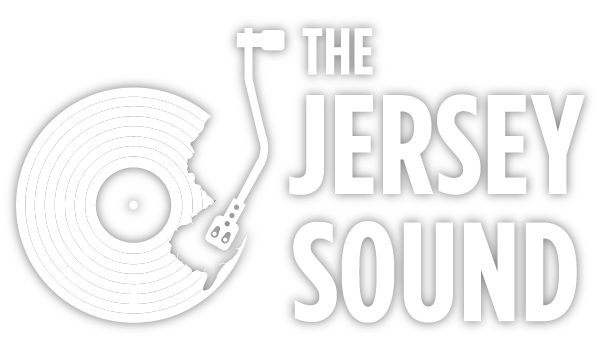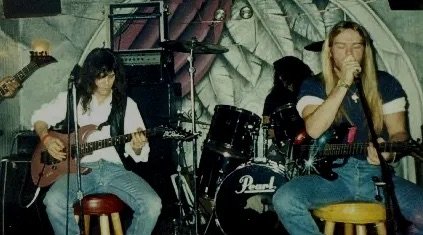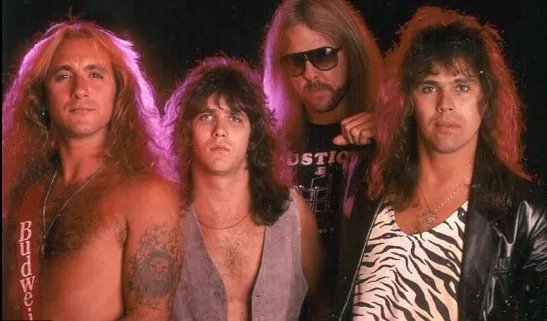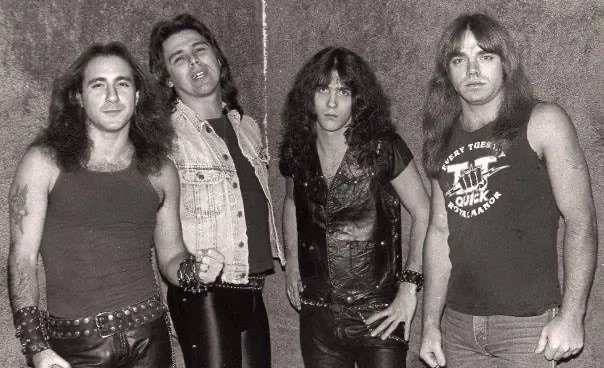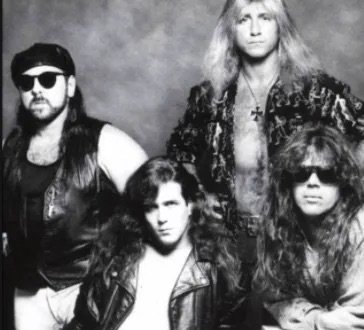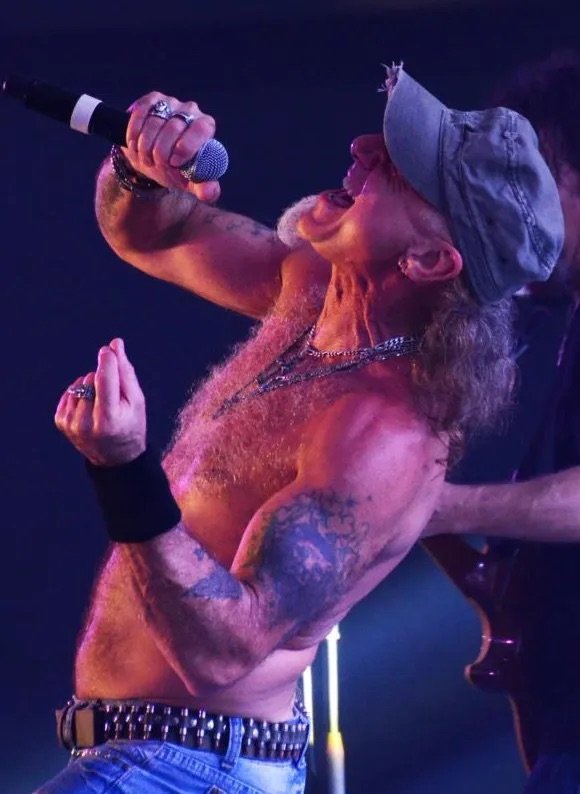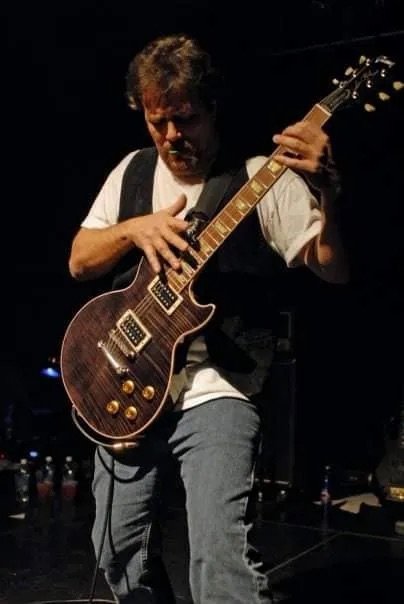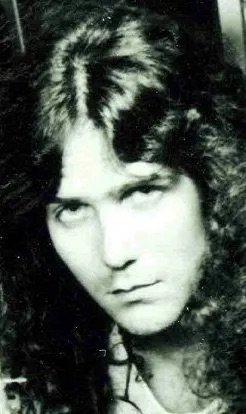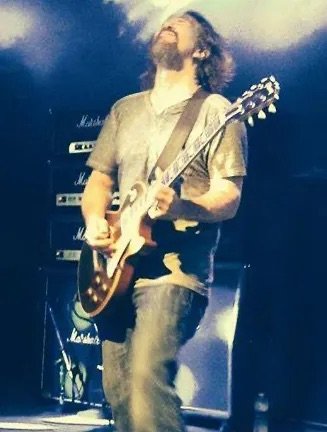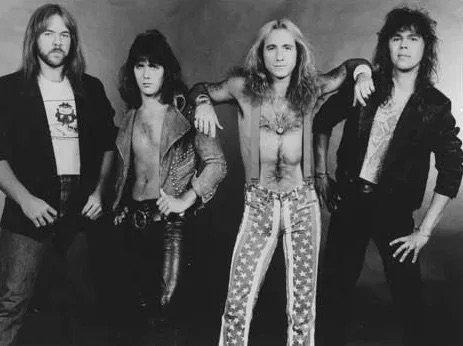Dave DiPietro: Guitar Hero
UP CLOSE
⭐️
Dave DiPietro
⭐️
UP CLOSE ⭐️ Dave DiPietro ⭐️
Those lucky enough to have seen Prophet, TT Quick or Nuclear Assault witnessed one of New Jersey’s greatest lead guitarists, Dave DiPietro.
Zakk Wylde of Ozzy and Black Label Society will tell you. So willDave “Snake” Sabo of Skid Row.
DiPietro was the model for both of them. Sabo and Wylde reached the heights of rock star excess with their respective bands. DiPietro, after aspiring for such, has settled into a comfortable groove performing at churches on Sundays. And y’know what? It doesn’t bother him in the least.
“A lot of people tell me I should’ve been more,” he admits, “that I should’ve received more for the music I’ve played in the way of fame and fortune. And here’s my answer to that. I wouldn’t trade one minute of everything I’ve been through that got me to where I’m at now. I’m so grateful. Both for what I had back then and for what I have now. I’m grateful for the friends I have. I’m grateful people listened then and listen now. And I’m especially grateful to know and befriend folks like Zakk, Snake, Ken Dubman and Mark Tornillo.”
Tornillo, at 67, is still chasing the dream, singing lead for German metal band Accept. Dubman, after being in Prophet with Dave, is working on a solo project with Dave still at his side. He’s blossomed from being a guitar gunslinger to being a singer/songwriter/guitarist/producer/arranger/solo artist.
Zakk Wylde: “Seeing Dave play every night was like a guitar lesson.”
Ken Dubman: “Dave’s one of the best rock guitarists on the planet. The dude’s talent is just insane. The thing is, he’s branched out to become quite an accomplished finger-picking acoustic player. He’s just monstrous. He draws in classical elements and actually strayed down that rabbit hole to the point where I had to pull him out of that a little bit to get him back on the rock track.”
This story starts as Dave is a high schooler listening to Van Halen records in his Connecticut bedroom. His local cover band happens to open for Michael Bolton. The future superstar singer is instantly blown away by the chops of this kid.
“I actually ended up playing guitar in one of Michael Bolton’s early local bands,” remembers DiPietro. “He was a tremendous mentor. None of us had any idea just how big he would become. He was extremely gracious and nurturing and took a great interest in me as a player. For a teenager, it was an amazing opportunity.
“Then Van Halen came to town to play the New Haven Memorial Coliseum. I was onstage with Michael Bolton at Toad’s Place when David Lee Roth walked in! We always had this long drum solo where we’d leave the stage and huddle in the dressing room. So Michael Bolton and David Lee Roth start talking. I’m introduced to him and Roth goes, `Oh! Little Eddie Fingers, are ya?’ He had been watching the whole time!
“Funny but a year later, I find myself playing those Eddie riffs in a Van Halen Tribute band called Fair Warning. That’s also when I first started writing original material. So we’re playing at The Fountain Casino in Aberdeen Township New Jersey, one night. I’m 19. We had already heard of TT Quick and their amazing singer, Mark Tornillo, who sounded like Bon Scott of AC-DC. We were blown away. I wanted to meet him so bad. Little did I know he was there that night and liked us.
DiPietro didn’t get to meet Tornillo that night, but got his contact information and reached out shortly thereafter. The phone conversation went something like this.
“Hi, you don’t know me but I’m the guitar player of Fair Warning.’”
“Yeah! I saw you play! I thought you guys did a great job.’”
“Hey listen, we have some original material with record company interest. (Not true.) I wonder if you’d sing on it if I sent you the demo?’
“And I could not believe when he said…
“Yeah, sure, ok, send it to me.’
“And that’s where the story really starts.”
DiPietro didn’t tell his Fair Warning bandmates that TT Quick’s Mark Tornillo had added vocals. But he played it for them. That conversation went something like this.
“Hey guys, I have something I want to play for you. Listen to this!”
They sit around and their eyes widen.
“Guess who the singer is?’”
They hadn’t a clue and found it hard to believe who it actually was. So he told them.
“C’mon Dave, who is it really?”
“I’m not kidding! It’s really him! Mark Tornillo!’”
“They freaked.”
TT Quick ’96 (l-r) Eric Ferro, Dave, Mark Tornillo & Walter Fortune
“We would really push each other. He’s a superior blues player. I had the street grit and brutal riffage he liked. It just blended. We knew it right from the jump.”
So Tornillo starts commuting from Jersey to Connecticut to record the material. “Child Of Sin” and “Victims” would both end up on a TT Quick EP but Atlantic Records rejected what they heard. Disappointment turned to elation, though, when Tornillo told DiPietro that TT Quick needed a guitarist. It took about two seconds for Dave to quit his band.
“They all told me it wouldn’t work out with Mark. We’re all friends to this day but I didn’t listen to them and off I went. Now I’m in TT Quick! I’m staying with Mark and his wife. We’re playing out, it’s great, but I still have the cassette demo burning a hole in my pocket. The rest of TT Quick didn’t even know about it.
“So one day I’m at the Route #18 Flea Market in East Brunswick having been in TT Quick for about a year. This guy comes up to me, noticing my satin TT Quick jacket and starts a conversation that goes a little something like this.
“`TT Quick! I know that band! I’m interested in you guys. My name is Jonny. I have a record store here called Rock’n’Roll Heaven and I just started a record label called MegaForce and we signed this band from California called Metallica. They’re gonna be really big.’ And I remember thinking to myself, `Metallica? What a corny name for a metal band!’
Jonny Z: “Do you guys have any original material?”
TT Quick becomes one of the first bands signed to MegaForce.
But fame and fortune were still a pipedream.
In fact, Dave “Snake” Sabo, after playing Madison Square Garden with Skid Row, once told DiPietro he “felt weird that it was he who made it big enough to play the Garden and not me. I told him he should never feel bad at his own tremendous accomplishment, that we all get what we’re supposed to get in the end. In fact, I told him, `you should feel great!’”
There was a period of time when both TT Quick and Prophet were rival cover bands both bringing in tremendous business for the clubs. DiPietro and Ken Dubman were well aware of each other but had yet to meet. Dubman was performing with The Edgar Cayce Band by the time DiPietro finally made his acquaintance.
Ken Dubman: “I started The Edgar Cayce Band with bassist Scott Metaxas in like ’85. We had just come back from recording the first Prophet record, going from being a working bar band to just sitting around waiting for the record to come out. We were so itching to play. So we grabbed White Tiger drummer Eric Ferro and went out to just play these little roadside bars. That morphed into adding Prophet singer Russell Arcara and it blew up into this huge thing where we’d play for Art Stock at his South Amboy club The Playpen on Wednesdays and his Old Bridge Birch Hill nightclub every Friday. It turned into a real scene like an East Coast Sunset Strip. Massive crowds! To have a thousand people in the Birch Hill every Friday? Lines around the block!”
DiPietro: “The first time I saw Ken he blew me away. He was and is an amazing player after my own heart. Not too much longer after that, we started doing shows together. We had these cover-band offshoots of our bands. Back then, If you were doing a record, but you wanted to go out and gig as a cover band to make ends meet, you had to use another name like when Blue Oyster Cult became Soft White Underbelly. So we did.
“Kenny and I found out that when we shared stages, it was magic. Rick Derringer’s `Rock’n’Roll Hoochie Coo’ was the song we first bonded over. We would really push each other. He’s a superior blues player. I had the street grit and brutal riffage he liked. It just blended. We knew it right from the jump. I mean, where do you ever meet someone that goes so well with what you’re doing?
“When MegaForce sold its catalog to Island, TT Quick was released. That’s when Ken and I started recording indie projects together. We were free to do anything. So when [bassist] Scott [Metaxas] asked me to record, I jumped at the chance. It ultimately led to the second Prophet album, Recycled ('88), where you have Kenny and I playing and spurring each other on. I always thought it was a great album. Scott produced. Pound-for-pound, Scott is one of the most talented guys I’ve ever met.
Enter Nuclear Assault.
DiPietro: “Yeah, mid-‘90s. There was a lull in the action then. Not much was going on. We were all going through our woes of life with an indie label while figuring out how to eat every day. Glenn Evans, drummer on the first TT Quick EP, went on to do the Nuclear Assault thing while Erik Ferro joined TT Quick. Slight differences in style and substance that causes people to go the way they go, no big deal, but Glenn reached out to me.”
TT Quick ’87 (l-r) Eric Ferro, Dave, Mark Tornillo & Walter Fortune
Drummer Glenn Evans: “Our guitar player in Nuclear Assault needs to leave. Would you consider replacing him? We have to be in the studio and we’re down one guitarist”
DiPietro: “Aw man, I don’t do this kind of music. It’s not really my thing.”
Evans: “C’mon, we really need somebody like now! Listen to what Metallica just did on the black album! We want to try something different too, push the envelope a little more towards rock and away from thrash.”
DiPietro: “Your fans will hate me! I’m gonna be the guy to change Nuclear Assault’s sound?”
Evans: “Hell yeah!”
Ultimately, the challenge was too much for DiPietro to resist. Evans gave him songs to learn. DiPietro got down to work and then went to see them. He wound up jumping onstage to jam. “I could barely keep up,” he remembers. “Thrash metal is FAST! I couldn’t believe the speed with which they played. It was a blur to me. I had to keep looking over at [bassist] Dan [Lilker]. It was the only way I could know where the heck I was within the song! Eventually, though, it’s like anything else. Your ear starts to catch up. It was music as an athletic event. But I was willing. Funny but then Dan decides to jump ship and form Brutal Truth. Now Nuclear Assault also needs a bass player. Glenn wants to do the next album with Miles Copeland on IRS and has no idea how that can happen without a bassist!
“I’ve got a guy for you,”
“Who?”
“Scott Metaxas from Prophet! And he can even produce the record.
“They were weird about it at first because they didn’t think of Scott as that kind of bass player. But I knew he could play anything. And he did.” Scott fit like a glove. He even wrote Something Wicked with DiPietro. He produced. He played bass. It was quite the departure but well-received. It led to a few years of all-out Nuclear Assault in the life of DiPietro.
Then along came grunge.
Grunge absolutely leveled the playing field, kicking metal to the side of the road where car after car ran over its dead carcass. “It changed things and we saw the changes first-hand,” says Dave. Nuclear Assault went from consistently packing venues to playing to diehards in half-empty clubs on both sides of the Atlantic.
DiPietro: “The band was great. There was no problem. The album did fairly well. But it got tougher and tougher to maintain. Plus, I had my own situation in touring. I’m leaving a wife and small son. I got homesick. We were living hand-to-mouth on the road. I couldn’t keep that up and still be married. So I told them I was out for the next album. Plus, there was something else going on. Right around that time, Ray Gillen asked me to record with him. I loved that guy! We were the best of friends.”
Ray Gillen had been in Black Sabbath and also Blue Murder with drummer Cozy Powell and Whitesnake’s John Sykes. He had tasted life at the top. He died from AIDS at 34 in 1993. “We all loved Ray,” DiPietro softly says. “He had approached me in California after Nuclear Assault finished recording Something Wicked. I wanted to but I told him of my obligation to go on the road in support of that record. That’s when we agreed to meet up in New York afterwards. I seem to remember that at the time, Ray seemed to have an urgency about his plan with me. I didn’t understand it at the time. He was the sweetest, most soulful human being on God's green Earth. I mean, man, he would stop and talk to the homeless on the streets of New York City. I just couldn’t understand why he seemed so upset that I had to go on tour first. How could we both have known he wouldn’t have the time left to do that? It’s one of my biggest regrets that I never got the chance to collaborate with him because who knows what that might’ve been."
A pause. Then, he says almost under his breath, "y'know, I’ve never really talked about this.”
Prophet: Russel Arcara, Jimmy Callahan, Scott Metaxas, Joe Zukowsky (above) Kenny Dubman, and Dave DiPietro (below)
Somewhere, somehow, in the midst of everything, DiPietro got addicted to alcohol and cocaine.
“I was always functional, always on time. I didn’t even realize how bad it was until I tried to stop. The ‘80s were a blur. By ’94, I found myself in an absolute battle with it. When I left Nuclear Assault, I left music. I went into mortgage banking. Where does one go with no college degree? I found a sales job and proved pretty good at it. It was always so funny when people would find out about my other life. Some of the realtors who I’d meet would go, `I know you! I remember that band!’
“Quitting music wasn’t the answer. I tried everything to get clean to no avail. Then came the day that someone invited me to a church. My first thought was, `what business do I have in going here?’ But I found that faith helped. I always had a belief in God and I wondered a lot about the Bible. How reliable was this Book? I started reading. You don’t really read the Bible. You study it. Big difference. I started going to church regularly. I remember I could barely keep my eyes open but it was part of my recovery. I had been in and out of Alcoholics Anonymous at that point. By ’99, I was desperate.”
It was at a Bible Study group where he finally saw the light.
“I never told anybody I was a musician. They didn’t know anything about me. They just knew me as this mortgage banker guy with a drug problem. Once they found out about the music, one of the pastors said, `hey, would you ever consider playing music here?’ My first reaction was, `aw man, you don’t want me.’ But they did. So I gave it a try. In 2002, it was so amazing that the very first time I strapped on an acoustic guitar to play with others in church, I remember the singer started singing a song and the entire congregation started singing at the top of their lungs. I was so incredibly moved by it. I get chills just talking about it today. Nothing in my musical experience had prepared me for that moment. It was very clear to me that something different was happening. It was very powerful. It drew me right in. It made me want to get involved more. It made me feel worthy enough to get involved.”
Once DiPietro started performing in churches, his outlook, his music, his life, all changed for the better. Then he relapsed. “Sure, I had some ups and downs. I’m not gonna lie. But it was short-lived. There’s a lot of different versions of recovery but mine is this. Because of the way I fully surrendered to what I believe is God, and because of how involved I got, and how unwilling I was to compromise with anything, addiction felt like I was living somebody’s else’s life. I don’t go to meetings but I found freedom in a way that’s unexplainable. I even stopped everything for a period of about three full years so I could totally concentrate on my recovery. I had to do it. Thus, I went from being unable to control it to not having any idea as to how I ever got that way in the first place.”
Maybe remembering Ray Gillen, he started performing at homeless shelters, and shelters for battered women. He started talking about his addiction in an effort to help others. He saw people’s lives change as a direct result.
“And when I saw the music being used for that, man, that’s the greatest use of my gift! I was doubly fortunate to meet my wife at the time I was getting clean. She was willing to stand behind me. She’s an amazing vocalist. We started doing music together in bigger churches. At one point, I found myself on a 60-foot stage doing a radio simulcast. It’s on a very high level now. We write and play with some of the best players I’ve ever played with. And know this—it’s not just something I show up for on Sundays. I’m not one guy on Saturday and another guy on Sunday. I am the guy who you see and hear on Sunday. I’m a guy who believes in Jesus, is tolerant of people, and is loving what I do today.”
